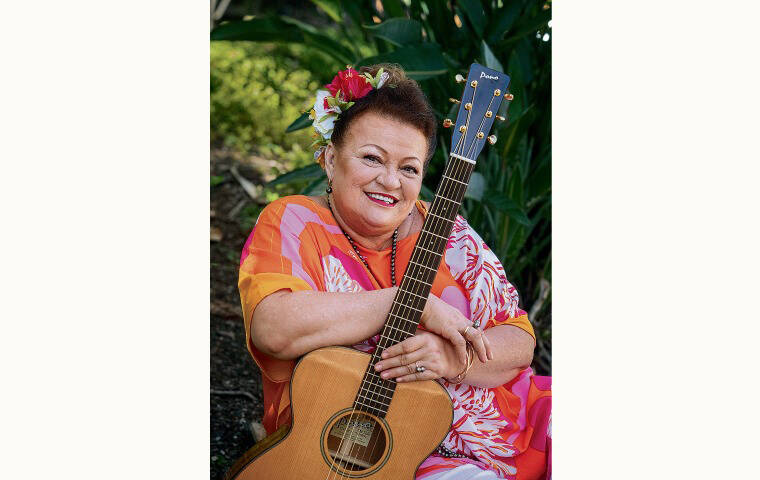Robi Kahakalau takes the stage with new partner Kala‘e Camarillo

CINDY ELLEN RUSSELL / CRUSSELL@STARADVERTISER.COM
Robi Kahakalau came to Hawaii to attend college in 1980 and immersed herself in Hawaiian studies.
Ask multi-Na Hoku Hanohano Award winner Robi Kahakalau the standard local question, “Where ya from?” and she’ll say she was “made in Hawaii and born in Germany.” Her parents — Hawaiian father, German mother — were in Hawaii when the “making” occurred but living in Germany by the time of her birth. Kahakalau’s father, a bass player known professionally as Bob Carter, spent so much time on the road that her first language was German; she became conversant in English after his tour schedule slowed down and he had more time for his family.
Kahakalau came to Hawaii to attend college in 1980 and immersed herself in Hawaiian studies. In 1992 she made a splash as a core member of the Hawaiian Style Band with Wade Cambern, Bryan Kessler and Merri Lake McGarry; the group won a Hoku Award for its first album, “Vanishing Treasures,” in 1993.
In 1995 she released her first solo album, “Sistah Robi.” The album won two Hokus in 1996, including female vocalist of the year.
On the club scene, she partnered professionally with Hoku winner Jeff Rasmussen. The duo’s remake of “Leather and Lace,” originally a hit for Stevie Nicks and Don Henley in 1982, became their musical signature.
These days, Hawaii is seeing Kahakalau with a new on-stage partner, Kala‘e Camarillo. He too is a Hoku winner.
This conversation had been edited for length and clarity.
Don't miss out on what's happening!
Stay in touch with breaking news, as it happens, conveniently in your email inbox. It's FREE!
I’ve seen you and Kala‘e several times and you fit together very nicely. How did you meet?
I was on Maui, and the person I was going to play with said I should do it by myself. I love playing, but I hate playing alone. I played for three years alone, so I know I can, but after playing with good guitarists, it’s hard to just hear any sounds that are out there. So I went up to the two boys who had been on stage (before me) and asked if they could help me out. One of them was Kala‘e … So we (two) played the first song and it was one of those times you can instantly tell that there was something there. To this day we’ve never rehearsed. It was just something that was meant to click. Then we found out that we are related, so I can call him my nephew and it doesn’t look so weird – like “old auntie with young boy.” Even if it was, I wouldn’t care because the music is so good, but because I can introduce him as my nephew it feels even more comfortable.
You and Kala‘e have videos on YouTube and you recorded “Old Kihei” as a duet (on his album) earlier this year. What’s next?
We are getting play on Hawaiian 105 KINE and we’ll be doing more recording.
Looking back to the days you were working with Jeff, what stands out?
The first time we played a couple songs together, we looked at each other and were, like, wait a minute, we got something here … And to this day, I always say that the way he plays (guitar) is exactly what I would play if I had the ability. He’s such a good guitar player and a great singer, and a great friend.
You look like there is more to the story.
People see Kala‘e and myself (but) they only see what they see on Instagram. I still play with Jeff but he lives in Waianae and I live in (east Oahu), and there’s so many gigs now out on his side that I don’t want to drive to, and he doesn’t want to drive to town. So it’s a geographical thing that we’re not playing as much as we used to. But when we do play together, we love and appreciate each other. So there’s been no falling out … or any disagreement or anything.
This is completely unrelated to music, but do you ever miss the opportunity to speak German? Or do you have opportunities to speak German?
I have (opportunities). Just this past weekend, I was with my brother and sister, and we don’t even notice (that we’re doing it) … So I definitely get plenty enough German, but I love to practice my French with French tourists. French is definitely my third best (language) — German, English, Hawaiian and French, so French and Hawaiian is kind of one fluency level, and then (I speak) Italian and Spanish. I love Italian.
What are you looking at doing next?
I want to go to Italy. And I when I go, I want to be (more fluent) than I am now.



